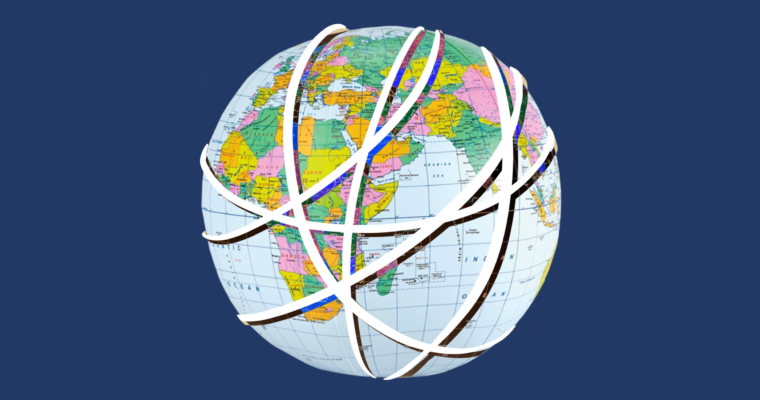By Jack Gao | The COVID19 crisis is shaping up to be the most severe challenge the world has to confront since World War II. At present, almost 800,000 cases have been reported from virtually every country in the world, with the death toll nearing 40,000. Not only is much of the global economy frozen as we fight the virus, but national borders are also being shut down to contain its spread. As this battle goes on, many are already predicting that the world may never be the same again.
The knee-jerk reaction is to substantially roll back on the current globalization regime, so global pandemics may be eliminated for once and for all. But this reflex towards nationalism completely misses the point. Crises like this one reflect on the perversion of current globalization, not on globalization per se. We should not throw the baby out with the bathwater, but instead, take the crisis as an opportunity to improve on the version of globalization that prioritized some objectives but neglected others.
First of all, a more divided world in no way guarantees global pandemics will no longer happen. One only needs to turn to the 1918 Spanish flu pandemic that claimed 100 million lives or the even more lethal Black Death episode, both when the world was more divided, for some evidence. Periodic outbreaks of infectious diseases have plagued humanity throughout history, and, more than anything, it was progressing in science and healthcare that accounted for the gradual decline in fatality and damages, in spite of advances in globalization. In fact, we could reasonably argue that better health outcomes, nutrition access, sanitation facilities wrought by economic development are important reasons we have fewer and less deadly pandemics today, thanks to globalization. It’s wishful thinking that less globalization will result in fewer pandemics.
Second, when crises do strike, we are much better positioned to respond to them as a globally connected community. Although leaving much to be desired, information sharing has proved key to containing the coronavirus outbreak. China alerted the WHO by the end of last year of unusual pneumonia in Wuhan; within days, Chinese scientists posted the genome of the new virus, allowing virologists in Berlin to produce the diagnostic test of the disease for worldwide access. We often take for granted communications of this kind today, which we can ill-afford if balkanization was to rule the day.
Even as borders are shut to reduce human flow at the moment, global commerce continues to play a crucial role to ensure the supply of medical products and equipment as we fight the pandemic. For instance, the crisis may have already subsided in China, but Chinese companies are currently working around the clock as ventilator orders pour in from the rest of the world. Similarly, at least a few dozen pharmaceutical companies from around the world are racing to develop vaccines and treatments for the virus, knowing that they’ll have ready access to a global marketplace to recoup their investments. Just imagine how much harder this battle would be if countries were left to their domestic supply chains or scientific knowledge.
Finally, while much is still unclear about how the current outbreak unfolded, from the evidence we do have, it is national mishandling or in some cases deglobalization factors that contributed the lion’s share to its unbridled spread. China’s earlier misstep on information reporting, America’s testing debacle and obsession with travel bans, and UK’s initial flirtation with herd immunity are just a few examples of national blunders that hastened the transmission of the virus, which have little to do with globalization. Meanwhile, in a bid to have America go it alone, Trump’s elimination of epistemologist based in China, staff cuts at the CDC, and heightened tariffs on Chinese medical products may well have made this health crisis worse than it has to be.
Each crisis is an opportunity in disguise, the coronavirus is no different. It should be taken as a reminder that our disregard to some objectives and narrow-minded pursuit of others have tilted the world off-balance. In a globalization solely focused on promoting international trade and financial flows and centered around organizations such as the World Bank and the IMF, this outbreak caught the incumbent international regime completely off-guard. Either in funding, capacity, or power, the World Health Organization has been no match to its counterparts charged with commercial and financial affairs. Seen in this light, the outbreak should serve as a rude awakening to a world economy that prioritizes economic integration over public health, environmental, and climate concerns.
As the fight to contain the coronavirus continues, many believe this crisis will bring an end to globalization as we know it, some may even work hard to make sure this is so out of self-interest. However, it bears emphasizing that a balkanized and disintegrated world is neither feasible nor desirable. The coronavirus does not have to kill globalization, instead, it is our chance to rebalance the world economy to better serve collective social goals and tackle future challenges as a coordinated global community.
Jack Gao is a Program Economist at the Institute for New Economic Thinking. He is interested in international economics and finance, energy policy, economic development, and the Chinese economy. He previously worked in financial product and data departments in Bloomberg Singapore, and reported on Asian financial markets in Bloomberg News from Shanghai. Jack holds a MPA in International Development from Harvard Kennedy School, and a B.S. in Economics from Singapore Management University. He has published articles on China Policy Review and Harvard Kennedy School Review.
